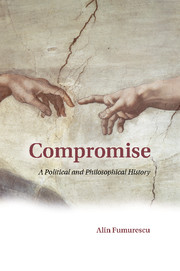
-
Select format
-
- Publisher:
- Cambridge University Press
- Publication date:
- 05 February 2013
- 11 February 2013
- ISBN:
- 9781139333689
- 9781107029439
- 9781107448544
- Dimensions:
- (228 x 152 mm)
- Weight & Pages:
- 0.58kg, 308 Pages
- Dimensions:
- (229 x 152 mm)
- Weight & Pages:
- 0.42kg, 308 Pages
You may already have access via personal or institutional login
Book description
This book offers for the first time a conceptual history of compromise. Alin Fumurescu combines contextual historical analysis of daily parlance and a survey of the usage of the word from the end of the sixteenth century to the beginning of the eighteenth century in both French and English with an analysis of canonical texts in the history of political thought. This book fills a significant gap in the literature about compromise and demonstrates the connection between different understandings of compromise and corresponding differences in understandings of political representation. In addition, Fumurescu addresses two controversial contemporary debates about when compromise is beneficial and when it should be avoided at all costs. A better understanding of the genealogy of compromise offers new venues for rethinking basic assumptions regarding political representation and the relationship between individuals and politics.
Awards
A Choice Outstanding Academic Title, 2013
Reviews
‘In this bold, scrupulous, and wholly original work of political theory, Alin Fumurescu undertakes a genealogy of this crucial but frequently maligned concept. In a fascinating reconstruction of the etymology of compromise, Fumurescu traces the roots of our ambivalence to the early modern world, when a largely positive English view that regards compromise as a healthy attribute of liberal politics diverged sharply from the French contempt for compromise as a betrayal of our innermost conscience. The author moves effortlessly from Athens and Rome to early modern Europe and beyond, connecting back up with today’s philosophical discussions of compromise. By tracing clear lines of influence between early modern intellectual history and our contemporary political tribulations, the author succeeds where many works of political theory fall short. Fumurescu’s insights will be of interest to historians, philosophers, political theorists, and policy makers alike.’
Richard Boyd - Georgetown University
‘When should you compromise, and when should you stick to your guns? There are many occasions in life and politics when it would be helpful to have a reliable answer to this question. One way of answering it is to survey the options, to see the answers that people have given over the years, and that is one of the things that this book does. But it does much more: it also carries out a profound philosophical analysis of the concept and of the many answers that have been given … If we can learn from the past, we can use this book to chart the future of compromise, the future that can be expected in different social and political regimes of this very valuable alternative to violence.’
John Christian Laursen - University of California, Riverside
‘This is intellectual history at its finest. Fumurescu presents a ‘conceptual genealogy’ of the hitherto surprisingly under-theorized concept of moral and political compromise since the sixteenth century. Focusing on both minor and canonical writings in the continental European and Anglo-American worlds, Fumurescu reveals conceptual tensions and ambiguities that continue to underpin contemporary understandings of the value and dangers of compromise in politics. His determination to pursue the evidence wherever it leads, from the classical and medieval worlds to contemporary political controversy, has resulted in a very wide ranging, erudite, and yet thoroughly accessible study. Any future work on the character of modern individualism, political representation, and self-representation, as well as the varieties of modern contractualism, will be obliged to take Fumurescu’s novel and profoundly challenging theses into account.’
Martyn P. Thompson - Tulane University
'Fumerescu has written one of the most interesting books of political theory in a long time … Writing with wit, depth, and an astonishing command of history and philosophy … Fumurescu investigates not only the etymology of the word [compromise] but the causes of its various shifts in meaning and the intellectual and practical consequences of those changes … a startling interesting story, and no one has ever told it better, for Fumurescu is doing more than merely regaling readers: this is both serious history and serious political theory … Highly recommended. Upper-division undergraduate, graduate, research, and professional collections.'
M. Berheide Source: Choice
Contents
Metrics
Altmetric attention score
Full text views
Full text views help Loading metrics...
Loading metrics...
* Views captured on Cambridge Core between #date#. This data will be updated every 24 hours.
Usage data cannot currently be displayed.
Accessibility standard: Unknown
Why this information is here
This section outlines the accessibility features of this content - including support for screen readers, full keyboard navigation and high-contrast display options. This may not be relevant for you.
Accessibility Information
Accessibility compliance for the PDF of this book is currently unknown and may be updated in the future.


